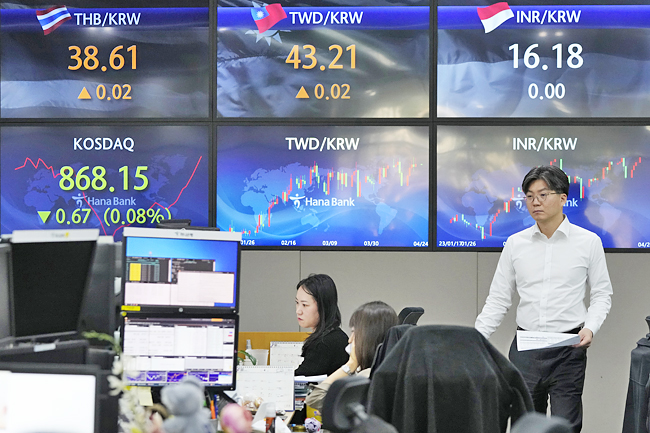AP – Asian stocks rose yesterday while European markets opened lower after the Federal Reserve raised its benchmark lending rate again to cool inflation and said it wasn’t sure what may come next.
Shanghai, Hong Kong and Wall Street futures advanced. London and Frankfurt declined. Japanese markets were closed for a holiday.
Wall Street’s benchmark S&P 500 index fell 0.7 per cent on Wednesday after the Fed announced a 0.25 percentage point increase in its lending rate. The Fed dropped a reference to “additional policy firming” in its statement but stopped short of declaring an end to rate hikes.
In early trading, the FTSE 100 in London lost 0.2 per cent to 7,773.89. Frankfurt’s DAX shed 0.2 per cent to 15,783.66 and the CAC 40 in Paris retreated 0.2 per cent to 7,389.89.
On Wall Street, futures for the benchmark S&P 500 index and the Dow Jones Industrial Average were up 0.1 per cent.
On Wednesday, the Dow fell 0.8 per cent and the Nasdaq composite slipped 0.5 per cent.
In Asia, the Shanghai Composite Index rose 0.8 per cent to 3,350.45 as trading resumed following a holiday. The Hang Seng in Hong Kong surged 1.4 per cent to 19,969.40.

The Kospi in Seoul lost less than 0.1 per cent to 2,500.94 and Sydney’s S&P-ASX 200 fell less than 0.1 per cent to 7,193.10.
India’s Sensex gained 0.5 per cent to 61,500.18. New Zealand and Southeast Asian markets advanced.
Traders expect a United States (US) recession this year as the Fed and other central banks in Europe and Asia try to extinguish inflation that was near multi-decade highs.
Jitters increased after three high-profile bank failures in the United States and one in Switzerland blamed on strain from higher interest rates. Central banks have tried to reassure investors by pledging steps including additional lending if needed.
Traders expect the Fed to start cutting rates as early as this year to prop up weakening economic growth.
Yesterday, Fed Chair Jerome Powell said he doesn’t expect rate cuts that soon.
Still, data from CME Group indicates traders see an 89 per cent changes of a cut of 0.25 percentage points at the Fed’s September meeting.
Traders worry industry turmoil might prompt banks to reduce lending, worsening downward pressure on economic activity. Powell mentioned a survey that is yet to be released and will show how much loan officers at banks said they are tightening lending standards. Shares of PacWest Bancorp, Western Alliance Bancorp and other rivals fell again a day after trading was halted following steep price slides. Western Alliance fell 4.4 per cent.
PacWest sank two per cent after being up earlier in the day but plunged another 52.5 per cent in after-hours trading. It and other similar lenders have large amounts of uninsured deposits – those above USD250,000 – which have become a larger liability because depositors have shown themselves willing to pull their money out at the first sign of trouble.
Advanced Micro Devices fell 9.2 per cent despite reporting stronger profit and revenue than expected. It gave a forecast for revenue in the current quarter that fell short of some analysts’ expectations.
In energy markets, benchmark US crude advanced USD0.34 to USD68.94 per barrel in electronic trading on the New York Mercantile Exchange. The contract plunged USD3.06 on Wednesday to USD68.60. Brent crude, the price basis for international oil trading, gained USD0.60 cents to USD72.93 per barrel in London. It fell USD2.99 the previous session to USD72.33.
The dollar fell to JPY134.74 from Wednesday’s JPY135.46. The euro edged down to USD1.1056 from USD1.1058.



















































